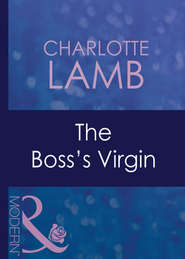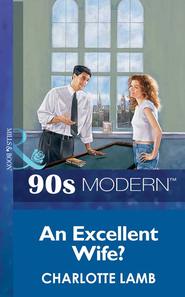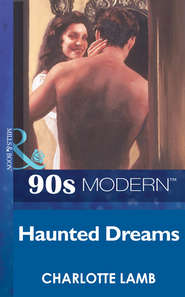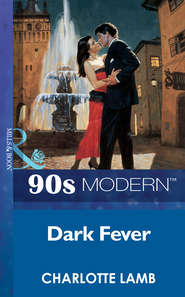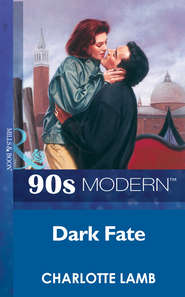По всем вопросам обращайтесь на: info@litportal.ru
(©) 2003-2025.
✖
Dreaming
Автор
Год написания книги
2018
Настройки чтения
Размер шрифта
Высота строк
Поля
The phone rang as Luisa was just starting out on her round, which had already been delayed endlessly by one crisis after another. She sighed as she picked up the phone. What else could go wrong? But her voice was soft and calm, betraying nothing of her thoughts. ‘Burns Unit.’
‘Sister Gilbey?’ The voice was familiar and a faint smile touched her mouth and eyes, changing her whole expression.
‘Yes, Mr Hallows,’ she said demurely, because in the hospital they always tried to keep their outward relationship professional. David sounded tired, and no wonder. He had been in Theatre for hours.
‘He’s in Recovery and he’ll be coming down to you in half an hour or so. I’m just sending you the papers. Considering the nature of the burns, he stood up to the operation pretty well. He’s fit and tough; he should pull through. Shock’s the immediate threat, of course. If he gets through the next twenty-four hours without a set-back the prognosis is hopeful.’
Luisa listened, frowning, her blue eyes dark with compassion. She had worked on this ward for several years now and was used to seeing men, women, and, even worse, children, with horrifying injuries, their faces and bodies badly burnt, but she never became hardened by custom; she was still moved and disturbed by what she saw.
‘Lucky we aren’t rushed off our feet at the moment. I’ll be able to have one nurse monitoring him closely all night. Whatever nursing can do we’ll do for him, poor man.’
‘I know you will—you have a very good team down there,’ David Hallows said warmly, then paused before adding, in a lower and more personal tone, ‘Talking about not being rushed off your feet, does that mean you will be able to come to the dance on Saturday, after all?’
He had invited her several weeks ago and she had been hesitant, warning him that she might have to work this weekend because her senior staff nurse would be on holiday and she had another girl away with a broken leg. The ward roster had had to be rearranged, and Luisa wasn’t sure whether or not she could get anyone to take charge of the ward on Saturday night.
‘Well, I’ve had to compromise, David,’ she said wryly. ‘I’ve arranged with Staff Nurse Jenkins from Surgical to do a split shift. She was on this ward for a long time before she moved to Surgical, so she knows the routine. She’ll work here from eight until two, and then I’ll take over and finish the shift.’
‘So you’ll come to the dance with me?’ His voice was pleased; she could imagine the smile on his calmly attractive face. David Hallows was not handsome, but he had a face people instinctively took to on sight. Warm brown eyes, set wide apart, direct and friendly; wide, placid cheekbones, a firm but kindly look to his mouth, and smooth brown hair—he was one of the most popular members of staff at Whinbury Hospital.
‘I’d love to! Thank you for asking me, David.’ Luisa had been out to dinner with him quite often over the past months, but they both knew that this invitation was different. At the hospital dance they would be very publicly paired off; everyone would be watching them, fascinated. In this closed community, people gossiped endlessly.
‘A pity you can’t have the whole night off! We could have gone on somewhere afterwards. Everyone else will be going back to Mack’s place, I gather.’
She laughed. ‘They usually do.’
‘Ending up with bacon and eggs for breakfast at dawn!’
‘Poor Mrs Mack—she’s a long-suffering soul.’
‘She seems to thrive on it, and being the wife of the chief consultant gives her a lot of status,’ David said drily.
‘I like her; she can be very kind.’
‘Hmm...well, she throws her weight around too much for me—thinks she’s Queen of Whinbury. I don’t like bossy women.’
Luisa’s eyes were amused; this confession was not news to her. She had seen David bristling whenever Mrs MacDonald appeared at the hospital. That regal manner didn’t worry Luisa, who had spent her training being ordered around by autocratic senior nurses, but she knew it put David’s back up.
He yawned then. ‘Oh, well, I’m going to bed now, but I’m on call all night, if I’m needed.’
‘You must be dead on your feet, poor David—I hope I won’t have to wake you up. Sleep well.’
David hung up and Luisa replaced the phone and left her office. The ward was shadowy, curtains drawn around some of the beds, one of her nurses sitting constantly beside a patient who was still on the danger list. Some beds were empty, stripped down to the plastic cover and smelling strongly of the disinfectant with which they had been washed. In others, patients lay rigidly like Egyptian mummies, their bedclothes carefully raised over a cradle so that no weight should lie on their bodies. They were afraid to move: lay there, trapped in pain, only the sheen of their eyes as she walked past betraying that they were alive and awake, and suffering. Luisa walked from bed to bed on almost noiseless feet, at her customary measured pace, used to the half-dark of the ward, the pools of yellow light here and there. She whispered gently to those who were awake, soothed, promised pain-killers, paused to watch those who slept before walking on again.
She liked working at night. There was a very special feel to a ward during those long dark hours when the rest of the world slept, and only you were awake. You came much closer to the patients than you could during the day. Then they had their guard up, were better able to hide their fears and anxieties. At night, though, they were at their lowest and needed reassurance, to know that they weren’t alone with their pain. She had become a nurse because she wanted to do a job that was more than just a way of earning money, and helping very ill people get through the long night made Luisa feel that she was doing something important.
Returning to her office, she did some paperwork, her capped head bent over her desk, a frown between her thin dark brows.
‘I’m back from the canteen, Sister,’ a cheerful voice behind her said. ‘Fish pie again—I wish they’d put some fish in it! It was all potato and parsley sauce.’
Luisa could imagine it and grimaced. ‘Please! You’re making me feel sick!’
‘Shall I tell the others to go now?’ Nurse Carter asked.
‘Yes, then give Mr Graham his injection, would you?’
A moment later she heard the quiet feet passing her door as her other two nurses went down to have a meal. Luisa made herself a cup of jasmine tea, a fragrant, pale golden liquid served without milk or sugar which she found refreshing during the night. She never ate in the canteen because the food was far too heavy: fatty or stolid, unimaginative. It was useless for the hospital dietitian to complain or protest. The canteen was run on a tight budget; they went for the cheapest alternative, and that was usually stodgy—bread, pasta, potatoes, often served as chips. Luisa ate fruit, nuts, yoghurt at her desk during the night, and ate her one large meal of the day at home before she came on duty each day.
The phone rang sharply in the silence, making her jump so that her pen skidded on the paper, ruining the word she had been writing. Her nerves were shot to hell tonight. Pull yourself together! she impatiently told herself, and picked up the phone. ‘Burns Unit.’
‘Surgical Recovery here. We’re just bringing Mr West down now.’
‘Right, we’re ready for him.’ Luisa was tidying her papers as she spoke, sliding them into a drawer in the desk and locking it.
The caller hung up. Luisa replaced her own phone and stood up, her white apron crackling. From the ward door, she could see the neatly made bed waiting for the new patient. She heard noises in the sluice-room just behind her and pushed open the door.
Anthea Carter was busy sterilising the bed pans. Flushed and faintly untidy already, she looked round, her face pinker than ever as she met Luisa’s blue eyes.
‘Did you want me, Sister? Sorry, Sister, I was trying to get on with these.’
‘They’re bringing the new patient down now, Nurse Carter. Leave that—I’ll get Nurse Brett to do it when she gets back from the canteen. I want you to stay with the new admission for the rest of this shift; he’s going to need constant supervision. You know how to recognise the signs of shock—that’s what we’re mostly worrying about, with this one. If you see anything worrying, don’t hesitate. Hit the panic button.’
Anthea Carter pulled down the bib of her apron, straightened the cap precariously perched on her curly hair. ‘Yes, Sister.’ She was a good nurse, in spite of her untidiness and lack of method. She was likeable, too, and Luisa smiled at her as she turned to leave.
They both heard the rattle of the lift doors. ‘There they are!’ Luisa said, moving to meet the new arrival. Anthea Carter deftly clipped back the swing doors so that the patient could be wheeled through into the ward by the porter pushing him, while Luisa was taking the folder of notes from the nurse who had come down with the patient. At the same time she took a quick look at the still figure being wheeled past her. He was unconscious; she winced at what she saw, but her professional training told her that in time his face could be rebuilt to hide the scars his burns would leave.
‘Zachary West,’ she murmured, looking at his notes. ‘Age thirty-four. Well, Dr Hallows says he’s strong and should pull through—I wonder what sort of patient he’s going to be?’
‘Not easy,’ said the nurse who had brought him down from the theatre floor. ‘I saw him when they brought him in... He was conscious for a while and made the air turn blue with his language.’
‘Not unusual,’ Luisa said absently, staring at the strong bone-structure of the unconscious man.
‘No, but he struck me as a very angry man. If he ever catches up with the guy who caused his accident, murder will be done.’
Luisa frowned and closed the folder of notes. ‘Thank you, Nurse, you can get back to your ward now.’ She walked down the ward to oversee the transfer of the patient from the theatre trolley to his waiting bed, a delicate operation in his condition, although he was unconscious and could not feel the pain which the lightest touch would otherwise have caused him.
Once he was installed she went back to her office to get on with her paperwork. Sometimes she wished she hadn’t been promoted: she preferred to deal with the patients rather than sit in here doing clerical work.
Just before dawn, Luisa did another tour of the ward. Anthea Carter was still beside Zachary West’s bed, keeping herself busy by mending a torn hem on one of her uniform aprons. Luisa studied his notes. Anthea had been taking his pulse and temperature every hour; Luisa followed the line. Nothing unexpected there.
‘He hasn’t shown any sign of waking up?’
‘Several times I’ve thought...’ Anthea broke off as there was a faint movement from the bed. Their voices must have disturbed the patient. His bruised lids flickered upward, his eyes glistening, silvery, unseeing, then he gave a strangled cry.
Luisa heard anguish and anger in the sound; she bent, murmuring comfortingly, not touching him because she knew how the lightest touch meant agony for him, but soothing him with her low, soft voice. The wild eyes turned towards her.
‘What have you done to me...?’
‘We’re looking after you, Mr West, don’t worry.’






